Organisational Behaviour: Sainsbury's Report - Leadership Analysis
VerifiedAdded on 2023/01/05
|20
|5626
|95
Report
AI Summary
This report on organisational behaviour examines the case of Sainsbury's, exploring how organisational culture, politics, and power dynamics influence individual and team performance. It delves into the impact of culture, analyzing different cultural models and their implications for a globalized business environment. The report also discusses motivational theories, including Maslow's Hierarchy of Needs and Vroom's Expectancy Theory, and their application in achieving organisational goals. Furthermore, it investigates the factors contributing to effective teams, team development theories, and the role of organisational psychology. Finally, the report addresses the relevance of team development theories, concepts, and philosophies that influence behaviour in the workplace, providing insights into leadership and management practices within the organisation. The report highlights the importance of soft skills and the relationship between task and relationship leadership.
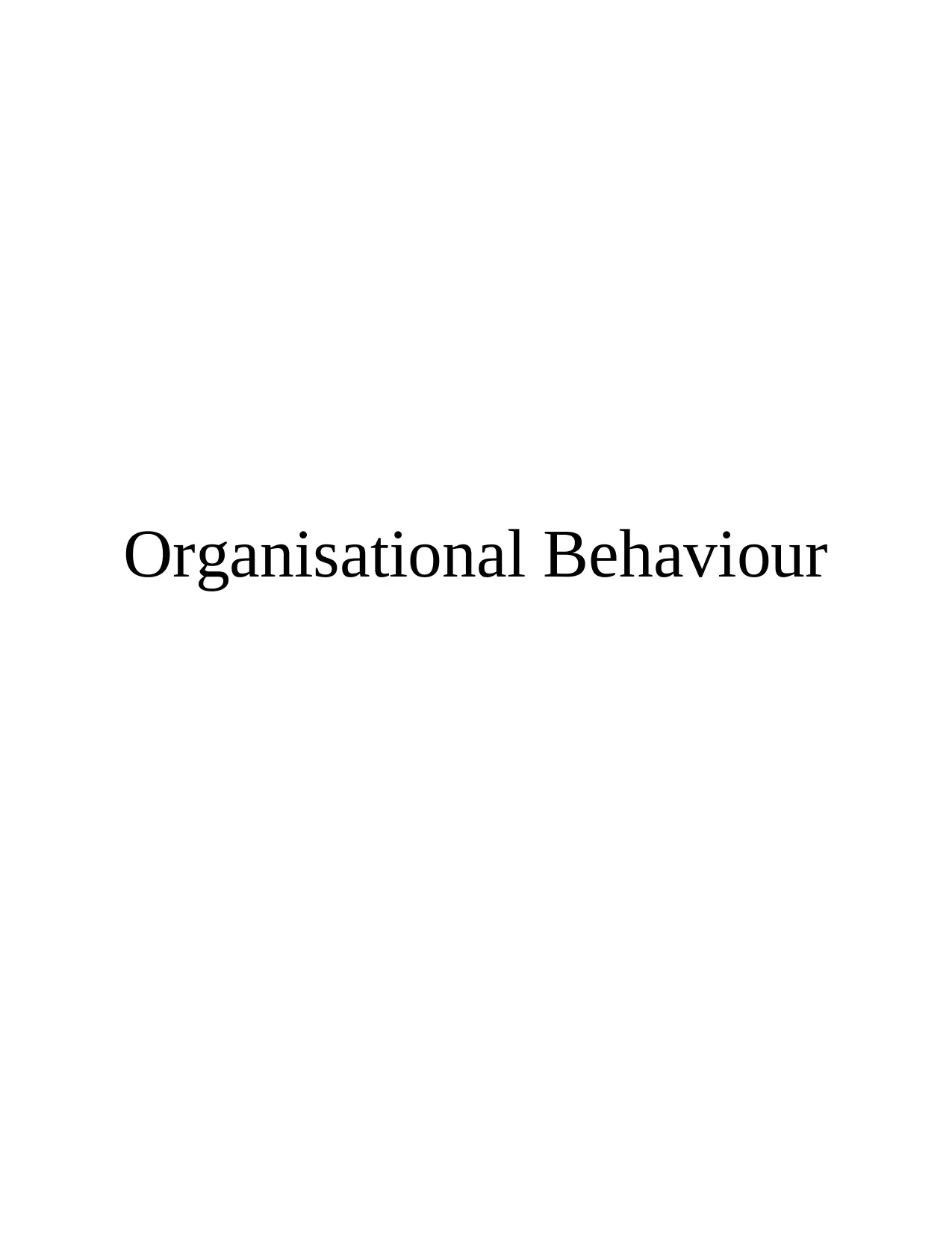
Organisational Behaviour
Paraphrase This Document
Need a fresh take? Get an instant paraphrase of this document with our AI Paraphraser
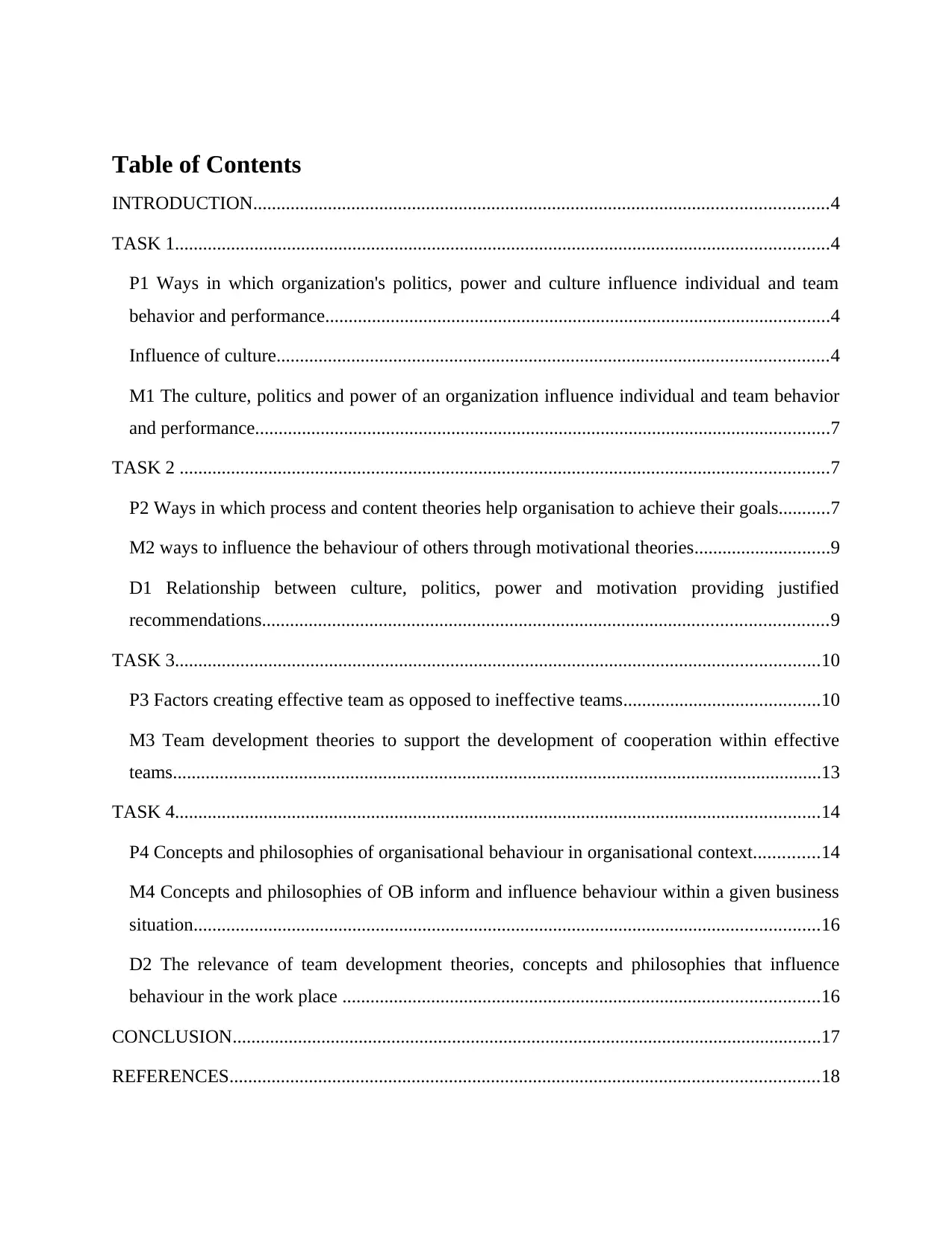
Table of Contents
INTRODUCTION...........................................................................................................................4
TASK 1............................................................................................................................................4
P1 Ways in which organization's politics, power and culture influence individual and team
behavior and performance............................................................................................................4
Influence of culture......................................................................................................................4
M1 The culture, politics and power of an organization influence individual and team behavior
and performance...........................................................................................................................7
TASK 2 ...........................................................................................................................................7
P2 Ways in which process and content theories help organisation to achieve their goals...........7
M2 ways to influence the behaviour of others through motivational theories.............................9
D1 Relationship between culture, politics, power and motivation providing justified
recommendations.........................................................................................................................9
TASK 3..........................................................................................................................................10
P3 Factors creating effective team as opposed to ineffective teams..........................................10
M3 Team development theories to support the development of cooperation within effective
teams...........................................................................................................................................13
TASK 4..........................................................................................................................................14
P4 Concepts and philosophies of organisational behaviour in organisational context..............14
M4 Concepts and philosophies of OB inform and influence behaviour within a given business
situation......................................................................................................................................16
D2 The relevance of team development theories, concepts and philosophies that influence
behaviour in the work place ......................................................................................................16
CONCLUSION..............................................................................................................................17
REFERENCES..............................................................................................................................18
INTRODUCTION...........................................................................................................................4
TASK 1............................................................................................................................................4
P1 Ways in which organization's politics, power and culture influence individual and team
behavior and performance............................................................................................................4
Influence of culture......................................................................................................................4
M1 The culture, politics and power of an organization influence individual and team behavior
and performance...........................................................................................................................7
TASK 2 ...........................................................................................................................................7
P2 Ways in which process and content theories help organisation to achieve their goals...........7
M2 ways to influence the behaviour of others through motivational theories.............................9
D1 Relationship between culture, politics, power and motivation providing justified
recommendations.........................................................................................................................9
TASK 3..........................................................................................................................................10
P3 Factors creating effective team as opposed to ineffective teams..........................................10
M3 Team development theories to support the development of cooperation within effective
teams...........................................................................................................................................13
TASK 4..........................................................................................................................................14
P4 Concepts and philosophies of organisational behaviour in organisational context..............14
M4 Concepts and philosophies of OB inform and influence behaviour within a given business
situation......................................................................................................................................16
D2 The relevance of team development theories, concepts and philosophies that influence
behaviour in the work place ......................................................................................................16
CONCLUSION..............................................................................................................................17
REFERENCES..............................................................................................................................18
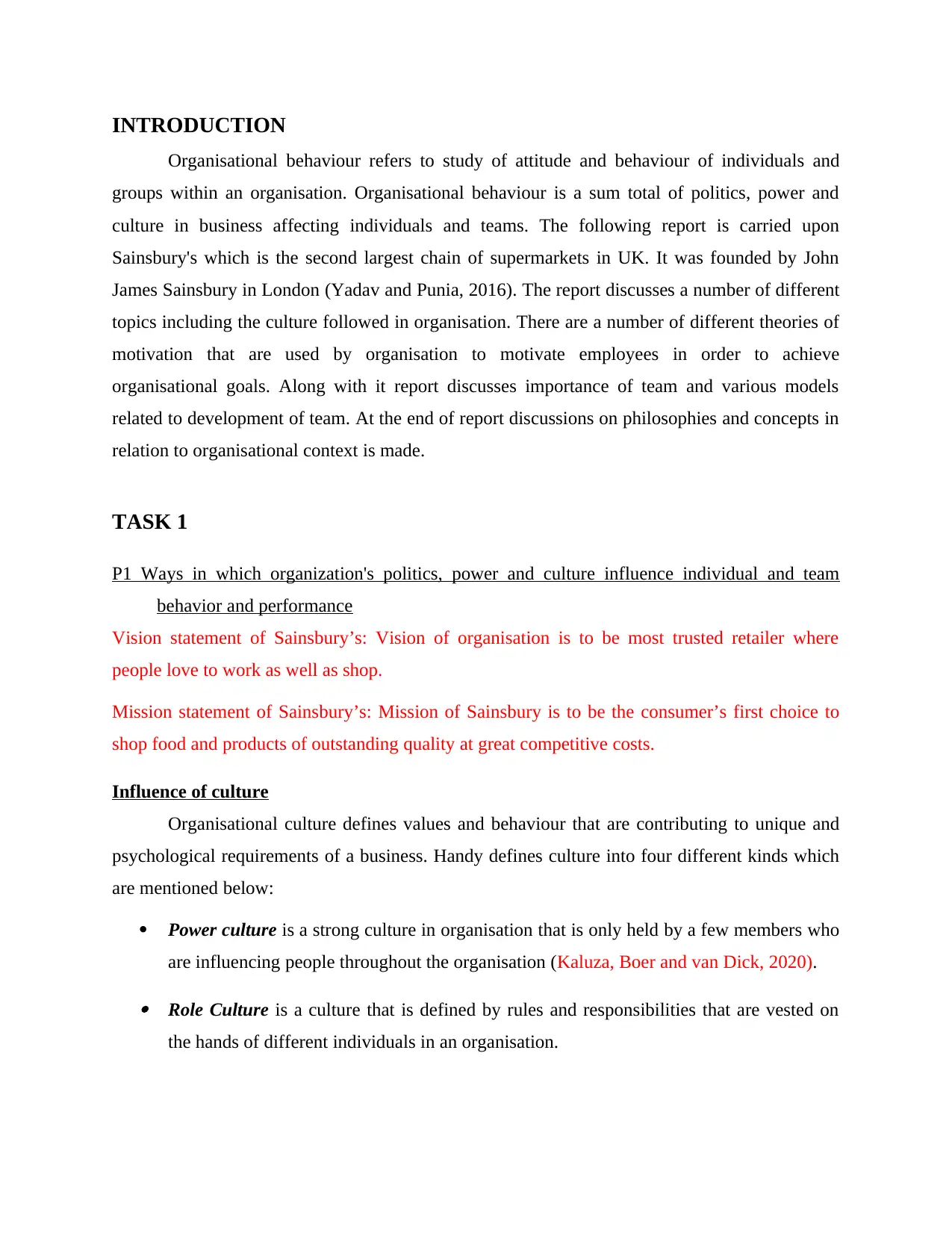
INTRODUCTION
Organisational behaviour refers to study of attitude and behaviour of individuals and
groups within an organisation. Organisational behaviour is a sum total of politics, power and
culture in business affecting individuals and teams. The following report is carried upon
Sainsbury's which is the second largest chain of supermarkets in UK. It was founded by John
James Sainsbury in London (Yadav and Punia, 2016). The report discusses a number of different
topics including the culture followed in organisation. There are a number of different theories of
motivation that are used by organisation to motivate employees in order to achieve
organisational goals. Along with it report discusses importance of team and various models
related to development of team. At the end of report discussions on philosophies and concepts in
relation to organisational context is made.
TASK 1
P1 Ways in which organization's politics, power and culture influence individual and team
behavior and performance
Vision statement of Sainsbury’s: Vision of organisation is to be most trusted retailer where
people love to work as well as shop.
Mission statement of Sainsbury’s: Mission of Sainsbury is to be the consumer’s first choice to
shop food and products of outstanding quality at great competitive costs.
Influence of culture
Organisational culture defines values and behaviour that are contributing to unique and
psychological requirements of a business. Handy defines culture into four different kinds which
are mentioned below:
Power culture is a strong culture in organisation that is only held by a few members who
are influencing people throughout the organisation (Kaluza, Boer and van Dick, 2020).
Role Culture is a culture that is defined by rules and responsibilities that are vested on
the hands of different individuals in an organisation.
Organisational behaviour refers to study of attitude and behaviour of individuals and
groups within an organisation. Organisational behaviour is a sum total of politics, power and
culture in business affecting individuals and teams. The following report is carried upon
Sainsbury's which is the second largest chain of supermarkets in UK. It was founded by John
James Sainsbury in London (Yadav and Punia, 2016). The report discusses a number of different
topics including the culture followed in organisation. There are a number of different theories of
motivation that are used by organisation to motivate employees in order to achieve
organisational goals. Along with it report discusses importance of team and various models
related to development of team. At the end of report discussions on philosophies and concepts in
relation to organisational context is made.
TASK 1
P1 Ways in which organization's politics, power and culture influence individual and team
behavior and performance
Vision statement of Sainsbury’s: Vision of organisation is to be most trusted retailer where
people love to work as well as shop.
Mission statement of Sainsbury’s: Mission of Sainsbury is to be the consumer’s first choice to
shop food and products of outstanding quality at great competitive costs.
Influence of culture
Organisational culture defines values and behaviour that are contributing to unique and
psychological requirements of a business. Handy defines culture into four different kinds which
are mentioned below:
Power culture is a strong culture in organisation that is only held by a few members who
are influencing people throughout the organisation (Kaluza, Boer and van Dick, 2020).
Role Culture is a culture that is defined by rules and responsibilities that are vested on
the hands of different individuals in an organisation.
⊘ This is a preview!⊘
Do you want full access?
Subscribe today to unlock all pages.

Trusted by 1+ million students worldwide
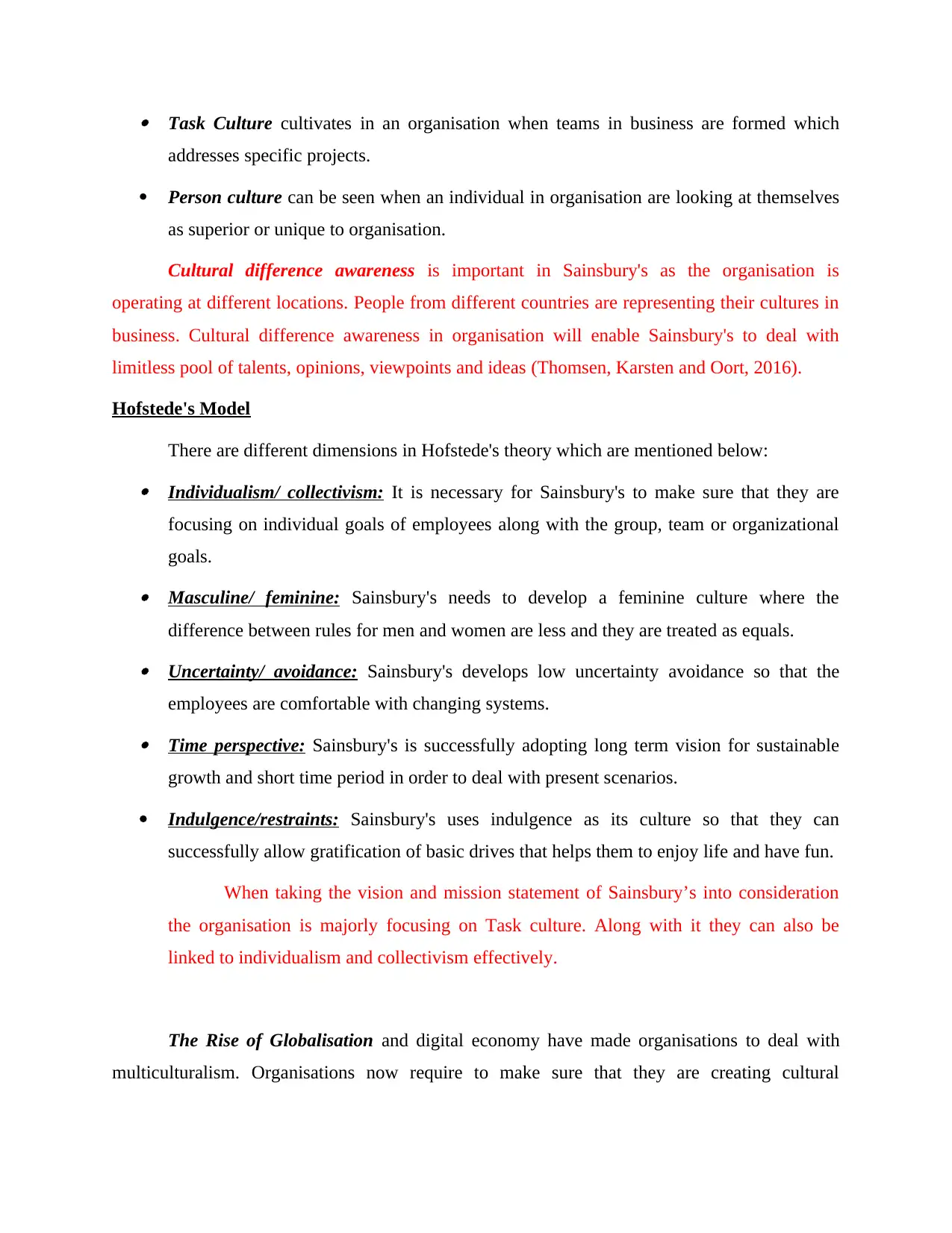
Task Culture cultivates in an organisation when teams in business are formed which
addresses specific projects.
Person culture can be seen when an individual in organisation are looking at themselves
as superior or unique to organisation.
Cultural difference awareness is important in Sainsbury's as the organisation is
operating at different locations. People from different countries are representing their cultures in
business. Cultural difference awareness in organisation will enable Sainsbury's to deal with
limitless pool of talents, opinions, viewpoints and ideas (Thomsen, Karsten and Oort, 2016).
Hofstede's Model
There are different dimensions in Hofstede's theory which are mentioned below: Individualism/ collectivism: It is necessary for Sainsbury's to make sure that they are
focusing on individual goals of employees along with the group, team or organizational
goals. Masculine/ feminine: Sainsbury's needs to develop a feminine culture where the
difference between rules for men and women are less and they are treated as equals. Uncertainty/ avoidance: Sainsbury's develops low uncertainty avoidance so that the
employees are comfortable with changing systems. Time perspective: Sainsbury's is successfully adopting long term vision for sustainable
growth and short time period in order to deal with present scenarios.
Indulgence/restraints: Sainsbury's uses indulgence as its culture so that they can
successfully allow gratification of basic drives that helps them to enjoy life and have fun.
When taking the vision and mission statement of Sainsbury’s into consideration
the organisation is majorly focusing on Task culture. Along with it they can also be
linked to individualism and collectivism effectively.
The Rise of Globalisation and digital economy have made organisations to deal with
multiculturalism. Organisations now require to make sure that they are creating cultural
addresses specific projects.
Person culture can be seen when an individual in organisation are looking at themselves
as superior or unique to organisation.
Cultural difference awareness is important in Sainsbury's as the organisation is
operating at different locations. People from different countries are representing their cultures in
business. Cultural difference awareness in organisation will enable Sainsbury's to deal with
limitless pool of talents, opinions, viewpoints and ideas (Thomsen, Karsten and Oort, 2016).
Hofstede's Model
There are different dimensions in Hofstede's theory which are mentioned below: Individualism/ collectivism: It is necessary for Sainsbury's to make sure that they are
focusing on individual goals of employees along with the group, team or organizational
goals. Masculine/ feminine: Sainsbury's needs to develop a feminine culture where the
difference between rules for men and women are less and they are treated as equals. Uncertainty/ avoidance: Sainsbury's develops low uncertainty avoidance so that the
employees are comfortable with changing systems. Time perspective: Sainsbury's is successfully adopting long term vision for sustainable
growth and short time period in order to deal with present scenarios.
Indulgence/restraints: Sainsbury's uses indulgence as its culture so that they can
successfully allow gratification of basic drives that helps them to enjoy life and have fun.
When taking the vision and mission statement of Sainsbury’s into consideration
the organisation is majorly focusing on Task culture. Along with it they can also be
linked to individualism and collectivism effectively.
The Rise of Globalisation and digital economy have made organisations to deal with
multiculturalism. Organisations now require to make sure that they are creating cultural
Paraphrase This Document
Need a fresh take? Get an instant paraphrase of this document with our AI Paraphraser
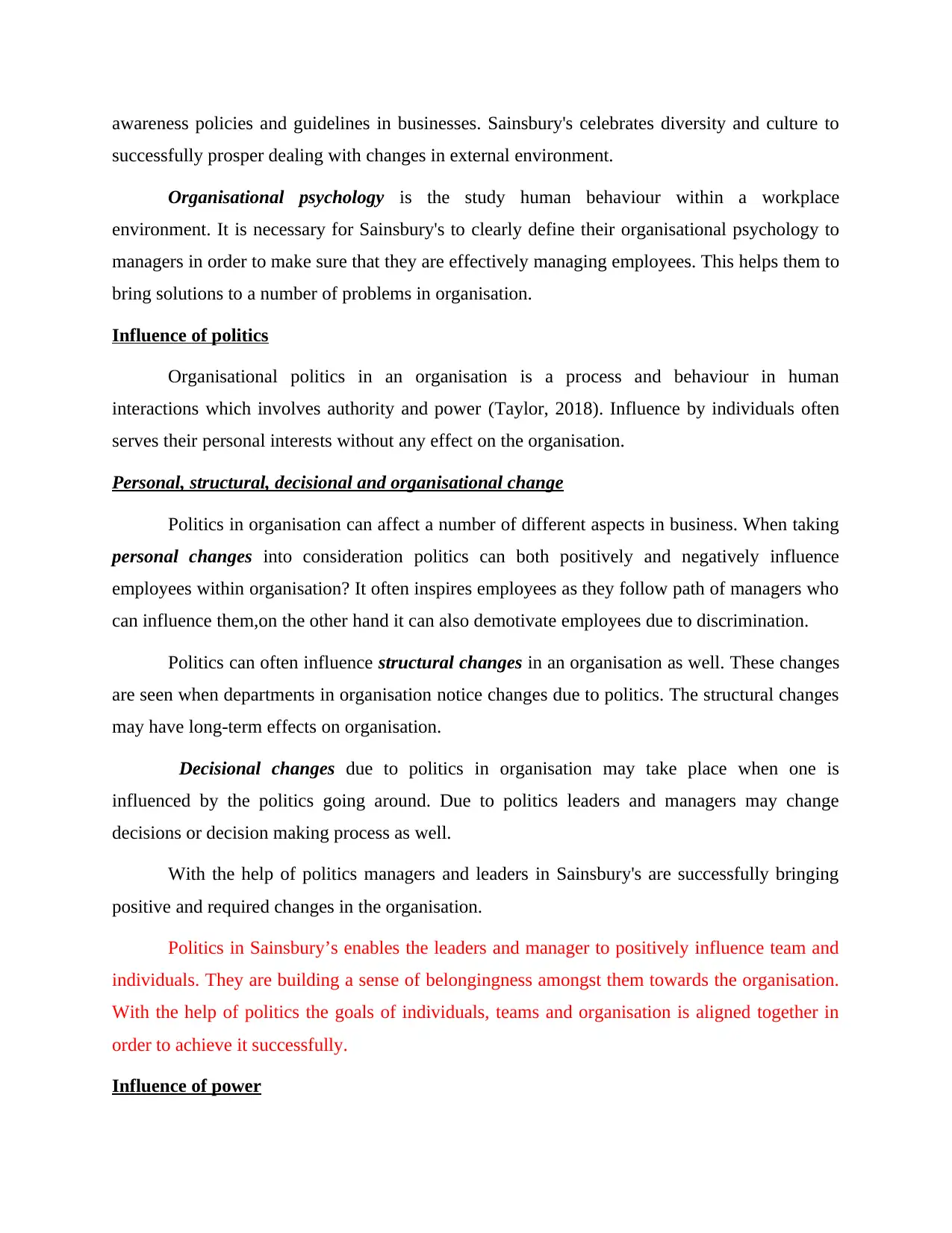
awareness policies and guidelines in businesses. Sainsbury's celebrates diversity and culture to
successfully prosper dealing with changes in external environment.
Organisational psychology is the study human behaviour within a workplace
environment. It is necessary for Sainsbury's to clearly define their organisational psychology to
managers in order to make sure that they are effectively managing employees. This helps them to
bring solutions to a number of problems in organisation.
Influence of politics
Organisational politics in an organisation is a process and behaviour in human
interactions which involves authority and power (Taylor, 2018). Influence by individuals often
serves their personal interests without any effect on the organisation.
Personal, structural, decisional and organisational change
Politics in organisation can affect a number of different aspects in business. When taking
personal changes into consideration politics can both positively and negatively influence
employees within organisation? It often inspires employees as they follow path of managers who
can influence them,on the other hand it can also demotivate employees due to discrimination.
Politics can often influence structural changes in an organisation as well. These changes
are seen when departments in organisation notice changes due to politics. The structural changes
may have long-term effects on organisation.
Decisional changes due to politics in organisation may take place when one is
influenced by the politics going around. Due to politics leaders and managers may change
decisions or decision making process as well.
With the help of politics managers and leaders in Sainsbury's are successfully bringing
positive and required changes in the organisation.
Politics in Sainsbury’s enables the leaders and manager to positively influence team and
individuals. They are building a sense of belongingness amongst them towards the organisation.
With the help of politics the goals of individuals, teams and organisation is aligned together in
order to achieve it successfully.
Influence of power
successfully prosper dealing with changes in external environment.
Organisational psychology is the study human behaviour within a workplace
environment. It is necessary for Sainsbury's to clearly define their organisational psychology to
managers in order to make sure that they are effectively managing employees. This helps them to
bring solutions to a number of problems in organisation.
Influence of politics
Organisational politics in an organisation is a process and behaviour in human
interactions which involves authority and power (Taylor, 2018). Influence by individuals often
serves their personal interests without any effect on the organisation.
Personal, structural, decisional and organisational change
Politics in organisation can affect a number of different aspects in business. When taking
personal changes into consideration politics can both positively and negatively influence
employees within organisation? It often inspires employees as they follow path of managers who
can influence them,on the other hand it can also demotivate employees due to discrimination.
Politics can often influence structural changes in an organisation as well. These changes
are seen when departments in organisation notice changes due to politics. The structural changes
may have long-term effects on organisation.
Decisional changes due to politics in organisation may take place when one is
influenced by the politics going around. Due to politics leaders and managers may change
decisions or decision making process as well.
With the help of politics managers and leaders in Sainsbury's are successfully bringing
positive and required changes in the organisation.
Politics in Sainsbury’s enables the leaders and manager to positively influence team and
individuals. They are building a sense of belongingness amongst them towards the organisation.
With the help of politics the goals of individuals, teams and organisation is aligned together in
order to achieve it successfully.
Influence of power
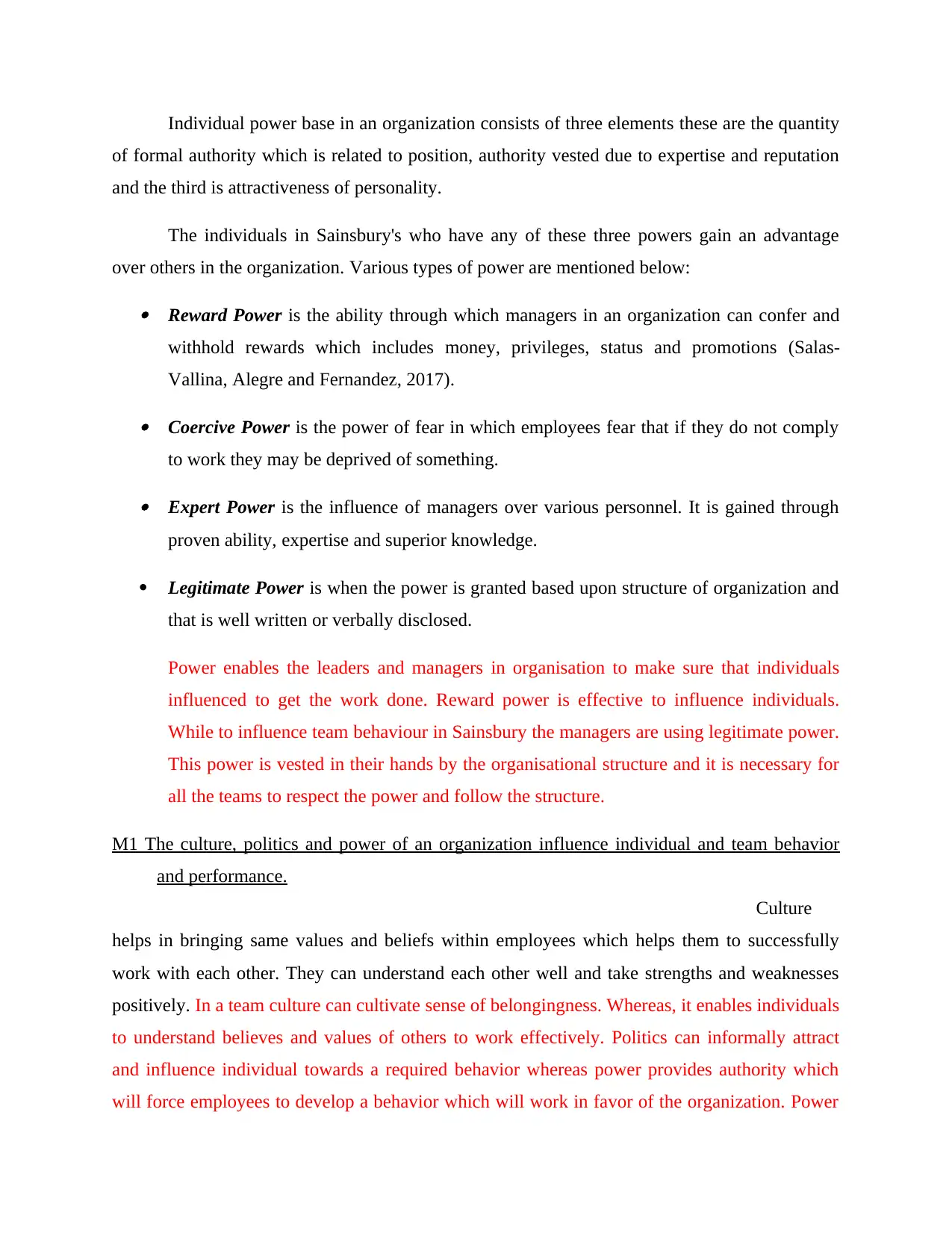
Individual power base in an organization consists of three elements these are the quantity
of formal authority which is related to position, authority vested due to expertise and reputation
and the third is attractiveness of personality.
The individuals in Sainsbury's who have any of these three powers gain an advantage
over others in the organization. Various types of power are mentioned below:
Reward Power is the ability through which managers in an organization can confer and
withhold rewards which includes money, privileges, status and promotions (Salas-
Vallina, Alegre and Fernandez, 2017).
Coercive Power is the power of fear in which employees fear that if they do not comply
to work they may be deprived of something.
Expert Power is the influence of managers over various personnel. It is gained through
proven ability, expertise and superior knowledge.
Legitimate Power is when the power is granted based upon structure of organization and
that is well written or verbally disclosed.
Power enables the leaders and managers in organisation to make sure that individuals
influenced to get the work done. Reward power is effective to influence individuals.
While to influence team behaviour in Sainsbury the managers are using legitimate power.
This power is vested in their hands by the organisational structure and it is necessary for
all the teams to respect the power and follow the structure.
M1 The culture, politics and power of an organization influence individual and team behavior
and performance.
Culture
helps in bringing same values and beliefs within employees which helps them to successfully
work with each other. They can understand each other well and take strengths and weaknesses
positively. In a team culture can cultivate sense of belongingness. Whereas, it enables individuals
to understand believes and values of others to work effectively. Politics can informally attract
and influence individual towards a required behavior whereas power provides authority which
will force employees to develop a behavior which will work in favor of the organization. Power
of formal authority which is related to position, authority vested due to expertise and reputation
and the third is attractiveness of personality.
The individuals in Sainsbury's who have any of these three powers gain an advantage
over others in the organization. Various types of power are mentioned below:
Reward Power is the ability through which managers in an organization can confer and
withhold rewards which includes money, privileges, status and promotions (Salas-
Vallina, Alegre and Fernandez, 2017).
Coercive Power is the power of fear in which employees fear that if they do not comply
to work they may be deprived of something.
Expert Power is the influence of managers over various personnel. It is gained through
proven ability, expertise and superior knowledge.
Legitimate Power is when the power is granted based upon structure of organization and
that is well written or verbally disclosed.
Power enables the leaders and managers in organisation to make sure that individuals
influenced to get the work done. Reward power is effective to influence individuals.
While to influence team behaviour in Sainsbury the managers are using legitimate power.
This power is vested in their hands by the organisational structure and it is necessary for
all the teams to respect the power and follow the structure.
M1 The culture, politics and power of an organization influence individual and team behavior
and performance.
Culture
helps in bringing same values and beliefs within employees which helps them to successfully
work with each other. They can understand each other well and take strengths and weaknesses
positively. In a team culture can cultivate sense of belongingness. Whereas, it enables individuals
to understand believes and values of others to work effectively. Politics can informally attract
and influence individual towards a required behavior whereas power provides authority which
will force employees to develop a behavior which will work in favor of the organization. Power
⊘ This is a preview!⊘
Do you want full access?
Subscribe today to unlock all pages.

Trusted by 1+ million students worldwide
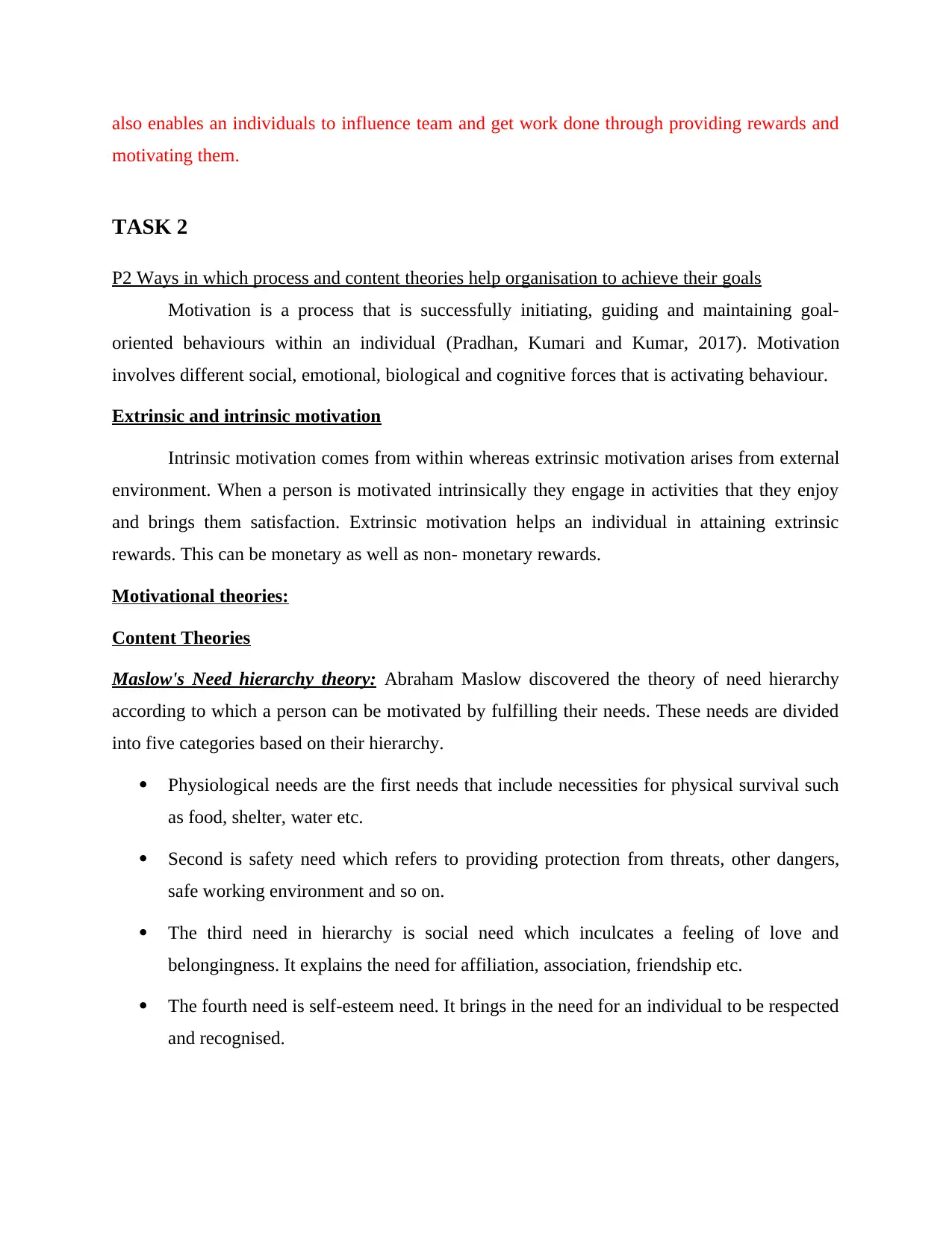
also enables an individuals to influence team and get work done through providing rewards and
motivating them.
TASK 2
P2 Ways in which process and content theories help organisation to achieve their goals
Motivation is a process that is successfully initiating, guiding and maintaining goal-
oriented behaviours within an individual (Pradhan, Kumari and Kumar, 2017). Motivation
involves different social, emotional, biological and cognitive forces that is activating behaviour.
Extrinsic and intrinsic motivation
Intrinsic motivation comes from within whereas extrinsic motivation arises from external
environment. When a person is motivated intrinsically they engage in activities that they enjoy
and brings them satisfaction. Extrinsic motivation helps an individual in attaining extrinsic
rewards. This can be monetary as well as non- monetary rewards.
Motivational theories:
Content Theories
Maslow's Need hierarchy theory: Abraham Maslow discovered the theory of need hierarchy
according to which a person can be motivated by fulfilling their needs. These needs are divided
into five categories based on their hierarchy.
Physiological needs are the first needs that include necessities for physical survival such
as food, shelter, water etc.
Second is safety need which refers to providing protection from threats, other dangers,
safe working environment and so on.
The third need in hierarchy is social need which inculcates a feeling of love and
belongingness. It explains the need for affiliation, association, friendship etc.
The fourth need is self-esteem need. It brings in the need for an individual to be respected
and recognised.
motivating them.
TASK 2
P2 Ways in which process and content theories help organisation to achieve their goals
Motivation is a process that is successfully initiating, guiding and maintaining goal-
oriented behaviours within an individual (Pradhan, Kumari and Kumar, 2017). Motivation
involves different social, emotional, biological and cognitive forces that is activating behaviour.
Extrinsic and intrinsic motivation
Intrinsic motivation comes from within whereas extrinsic motivation arises from external
environment. When a person is motivated intrinsically they engage in activities that they enjoy
and brings them satisfaction. Extrinsic motivation helps an individual in attaining extrinsic
rewards. This can be monetary as well as non- monetary rewards.
Motivational theories:
Content Theories
Maslow's Need hierarchy theory: Abraham Maslow discovered the theory of need hierarchy
according to which a person can be motivated by fulfilling their needs. These needs are divided
into five categories based on their hierarchy.
Physiological needs are the first needs that include necessities for physical survival such
as food, shelter, water etc.
Second is safety need which refers to providing protection from threats, other dangers,
safe working environment and so on.
The third need in hierarchy is social need which inculcates a feeling of love and
belongingness. It explains the need for affiliation, association, friendship etc.
The fourth need is self-esteem need. It brings in the need for an individual to be respected
and recognised.
Paraphrase This Document
Need a fresh take? Get an instant paraphrase of this document with our AI Paraphraser
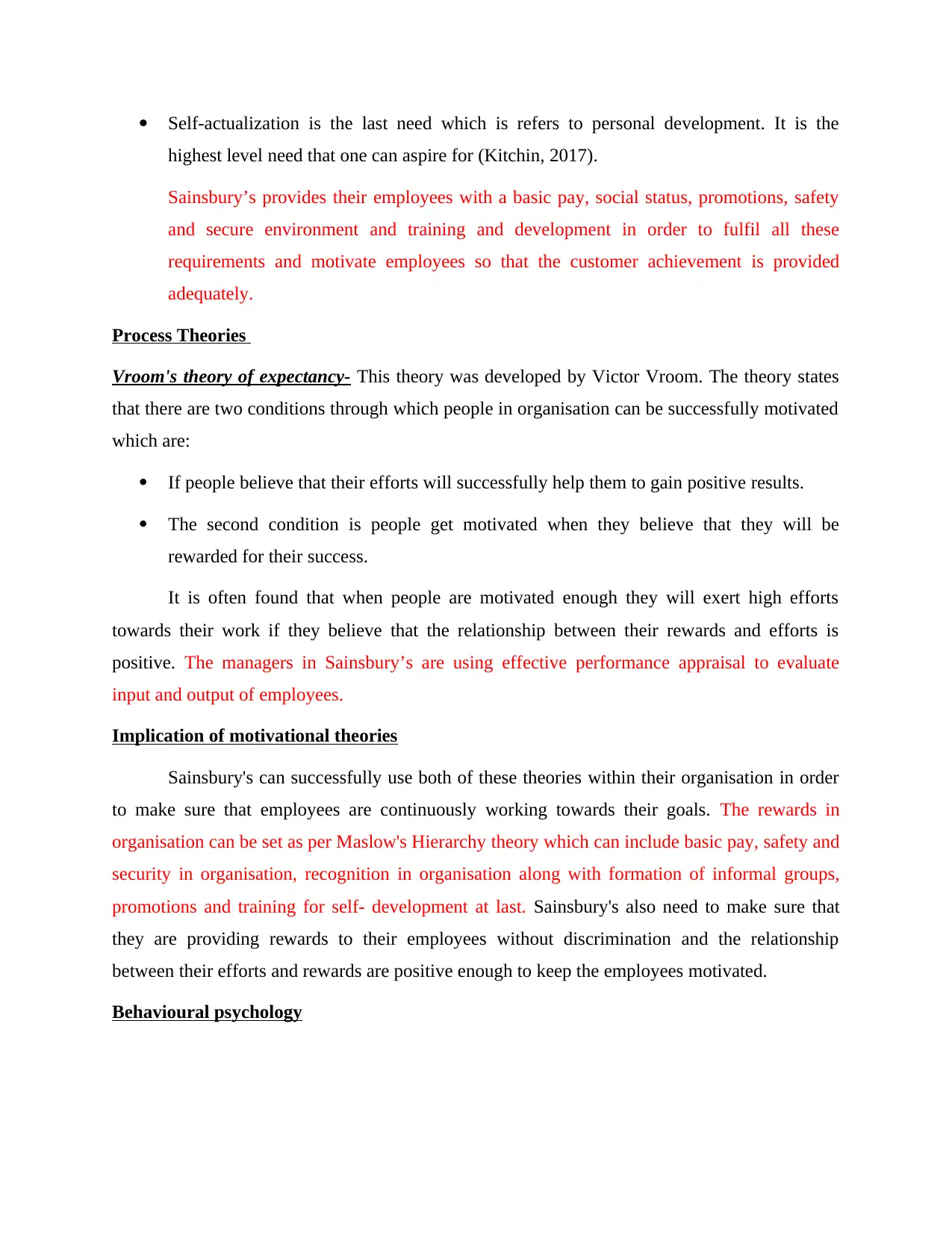
Self-actualization is the last need which is refers to personal development. It is the
highest level need that one can aspire for (Kitchin, 2017).
Sainsbury’s provides their employees with a basic pay, social status, promotions, safety
and secure environment and training and development in order to fulfil all these
requirements and motivate employees so that the customer achievement is provided
adequately.
Process Theories
Vroom's theory of expectancy- This theory was developed by Victor Vroom. The theory states
that there are two conditions through which people in organisation can be successfully motivated
which are:
If people believe that their efforts will successfully help them to gain positive results.
The second condition is people get motivated when they believe that they will be
rewarded for their success.
It is often found that when people are motivated enough they will exert high efforts
towards their work if they believe that the relationship between their rewards and efforts is
positive. The managers in Sainsbury’s are using effective performance appraisal to evaluate
input and output of employees.
Implication of motivational theories
Sainsbury's can successfully use both of these theories within their organisation in order
to make sure that employees are continuously working towards their goals. The rewards in
organisation can be set as per Maslow's Hierarchy theory which can include basic pay, safety and
security in organisation, recognition in organisation along with formation of informal groups,
promotions and training for self- development at last. Sainsbury's also need to make sure that
they are providing rewards to their employees without discrimination and the relationship
between their efforts and rewards are positive enough to keep the employees motivated.
Behavioural psychology
highest level need that one can aspire for (Kitchin, 2017).
Sainsbury’s provides their employees with a basic pay, social status, promotions, safety
and secure environment and training and development in order to fulfil all these
requirements and motivate employees so that the customer achievement is provided
adequately.
Process Theories
Vroom's theory of expectancy- This theory was developed by Victor Vroom. The theory states
that there are two conditions through which people in organisation can be successfully motivated
which are:
If people believe that their efforts will successfully help them to gain positive results.
The second condition is people get motivated when they believe that they will be
rewarded for their success.
It is often found that when people are motivated enough they will exert high efforts
towards their work if they believe that the relationship between their rewards and efforts is
positive. The managers in Sainsbury’s are using effective performance appraisal to evaluate
input and output of employees.
Implication of motivational theories
Sainsbury's can successfully use both of these theories within their organisation in order
to make sure that employees are continuously working towards their goals. The rewards in
organisation can be set as per Maslow's Hierarchy theory which can include basic pay, safety and
security in organisation, recognition in organisation along with formation of informal groups,
promotions and training for self- development at last. Sainsbury's also need to make sure that
they are providing rewards to their employees without discrimination and the relationship
between their efforts and rewards are positive enough to keep the employees motivated.
Behavioural psychology
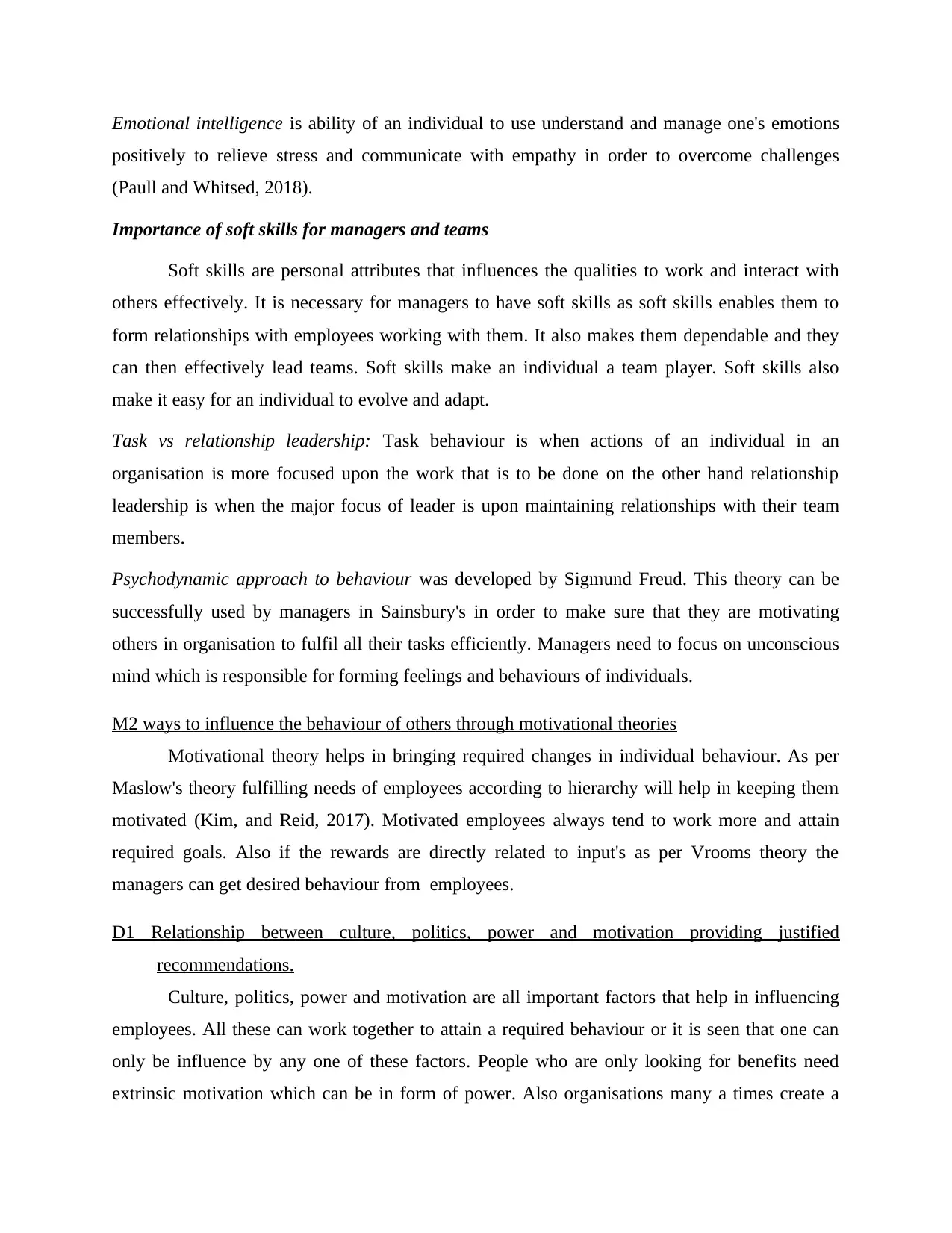
Emotional intelligence is ability of an individual to use understand and manage one's emotions
positively to relieve stress and communicate with empathy in order to overcome challenges
(Paull and Whitsed, 2018).
Importance of soft skills for managers and teams
Soft skills are personal attributes that influences the qualities to work and interact with
others effectively. It is necessary for managers to have soft skills as soft skills enables them to
form relationships with employees working with them. It also makes them dependable and they
can then effectively lead teams. Soft skills make an individual a team player. Soft skills also
make it easy for an individual to evolve and adapt.
Task vs relationship leadership: Task behaviour is when actions of an individual in an
organisation is more focused upon the work that is to be done on the other hand relationship
leadership is when the major focus of leader is upon maintaining relationships with their team
members.
Psychodynamic approach to behaviour was developed by Sigmund Freud. This theory can be
successfully used by managers in Sainsbury's in order to make sure that they are motivating
others in organisation to fulfil all their tasks efficiently. Managers need to focus on unconscious
mind which is responsible for forming feelings and behaviours of individuals.
M2 ways to influence the behaviour of others through motivational theories
Motivational theory helps in bringing required changes in individual behaviour. As per
Maslow's theory fulfilling needs of employees according to hierarchy will help in keeping them
motivated (Kim, and Reid, 2017). Motivated employees always tend to work more and attain
required goals. Also if the rewards are directly related to input's as per Vrooms theory the
managers can get desired behaviour from employees.
D1 Relationship between culture, politics, power and motivation providing justified
recommendations.
Culture, politics, power and motivation are all important factors that help in influencing
employees. All these can work together to attain a required behaviour or it is seen that one can
only be influence by any one of these factors. People who are only looking for benefits need
extrinsic motivation which can be in form of power. Also organisations many a times create a
positively to relieve stress and communicate with empathy in order to overcome challenges
(Paull and Whitsed, 2018).
Importance of soft skills for managers and teams
Soft skills are personal attributes that influences the qualities to work and interact with
others effectively. It is necessary for managers to have soft skills as soft skills enables them to
form relationships with employees working with them. It also makes them dependable and they
can then effectively lead teams. Soft skills make an individual a team player. Soft skills also
make it easy for an individual to evolve and adapt.
Task vs relationship leadership: Task behaviour is when actions of an individual in an
organisation is more focused upon the work that is to be done on the other hand relationship
leadership is when the major focus of leader is upon maintaining relationships with their team
members.
Psychodynamic approach to behaviour was developed by Sigmund Freud. This theory can be
successfully used by managers in Sainsbury's in order to make sure that they are motivating
others in organisation to fulfil all their tasks efficiently. Managers need to focus on unconscious
mind which is responsible for forming feelings and behaviours of individuals.
M2 ways to influence the behaviour of others through motivational theories
Motivational theory helps in bringing required changes in individual behaviour. As per
Maslow's theory fulfilling needs of employees according to hierarchy will help in keeping them
motivated (Kim, and Reid, 2017). Motivated employees always tend to work more and attain
required goals. Also if the rewards are directly related to input's as per Vrooms theory the
managers can get desired behaviour from employees.
D1 Relationship between culture, politics, power and motivation providing justified
recommendations.
Culture, politics, power and motivation are all important factors that help in influencing
employees. All these can work together to attain a required behaviour or it is seen that one can
only be influence by any one of these factors. People who are only looking for benefits need
extrinsic motivation which can be in form of power. Also organisations many a times create a
⊘ This is a preview!⊘
Do you want full access?
Subscribe today to unlock all pages.

Trusted by 1+ million students worldwide
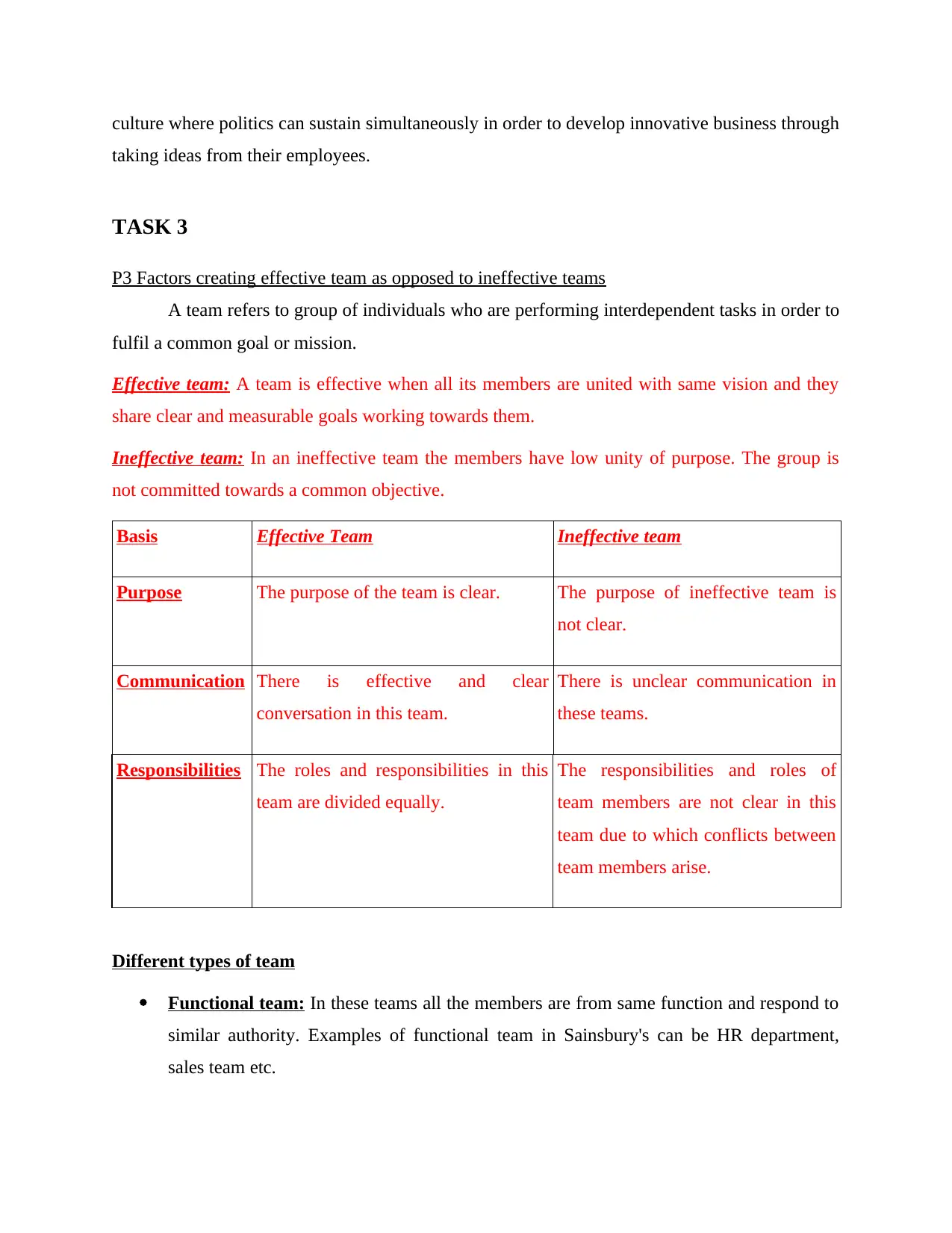
culture where politics can sustain simultaneously in order to develop innovative business through
taking ideas from their employees.
TASK 3
P3 Factors creating effective team as opposed to ineffective teams
A team refers to group of individuals who are performing interdependent tasks in order to
fulfil a common goal or mission.
Effective team: A team is effective when all its members are united with same vision and they
share clear and measurable goals working towards them.
Ineffective team: In an ineffective team the members have low unity of purpose. The group is
not committed towards a common objective.
Basis Effective Team Ineffective team
Purpose The purpose of the team is clear. The purpose of ineffective team is
not clear.
Communication There is effective and clear
conversation in this team.
There is unclear communication in
these teams.
Responsibilities The roles and responsibilities in this
team are divided equally.
The responsibilities and roles of
team members are not clear in this
team due to which conflicts between
team members arise.
Different types of team
Functional team: In these teams all the members are from same function and respond to
similar authority. Examples of functional team in Sainsbury's can be HR department,
sales team etc.
taking ideas from their employees.
TASK 3
P3 Factors creating effective team as opposed to ineffective teams
A team refers to group of individuals who are performing interdependent tasks in order to
fulfil a common goal or mission.
Effective team: A team is effective when all its members are united with same vision and they
share clear and measurable goals working towards them.
Ineffective team: In an ineffective team the members have low unity of purpose. The group is
not committed towards a common objective.
Basis Effective Team Ineffective team
Purpose The purpose of the team is clear. The purpose of ineffective team is
not clear.
Communication There is effective and clear
conversation in this team.
There is unclear communication in
these teams.
Responsibilities The roles and responsibilities in this
team are divided equally.
The responsibilities and roles of
team members are not clear in this
team due to which conflicts between
team members arise.
Different types of team
Functional team: In these teams all the members are from same function and respond to
similar authority. Examples of functional team in Sainsbury's can be HR department,
sales team etc.
Paraphrase This Document
Need a fresh take? Get an instant paraphrase of this document with our AI Paraphraser
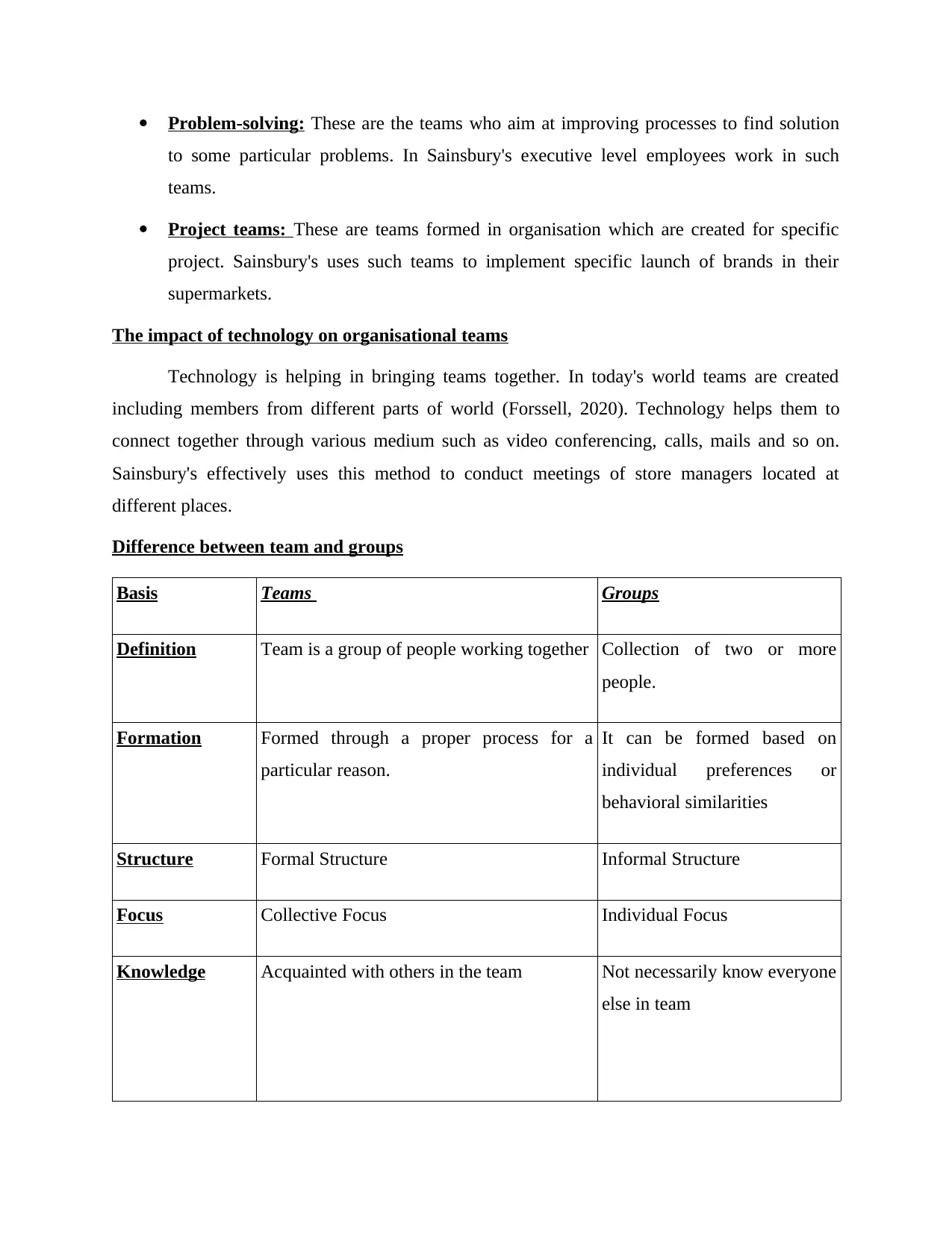
Problem-solving: These are the teams who aim at improving processes to find solution
to some particular problems. In Sainsbury's executive level employees work in such
teams.
Project teams: These are teams formed in organisation which are created for specific
project. Sainsbury's uses such teams to implement specific launch of brands in their
supermarkets.
The impact of technology on organisational teams
Technology is helping in bringing teams together. In today's world teams are created
including members from different parts of world (Forssell, 2020). Technology helps them to
connect together through various medium such as video conferencing, calls, mails and so on.
Sainsbury's effectively uses this method to conduct meetings of store managers located at
different places.
Difference between team and groups
Basis Teams Groups
Definition Team is a group of people working together Collection of two or more
people.
Formation Formed through a proper process for a
particular reason.
It can be formed based on
individual preferences or
behavioral similarities
Structure Formal Structure Informal Structure
Focus Collective Focus Individual Focus
Knowledge Acquainted with others in the team Not necessarily know everyone
else in team
to some particular problems. In Sainsbury's executive level employees work in such
teams.
Project teams: These are teams formed in organisation which are created for specific
project. Sainsbury's uses such teams to implement specific launch of brands in their
supermarkets.
The impact of technology on organisational teams
Technology is helping in bringing teams together. In today's world teams are created
including members from different parts of world (Forssell, 2020). Technology helps them to
connect together through various medium such as video conferencing, calls, mails and so on.
Sainsbury's effectively uses this method to conduct meetings of store managers located at
different places.
Difference between team and groups
Basis Teams Groups
Definition Team is a group of people working together Collection of two or more
people.
Formation Formed through a proper process for a
particular reason.
It can be formed based on
individual preferences or
behavioral similarities
Structure Formal Structure Informal Structure
Focus Collective Focus Individual Focus
Knowledge Acquainted with others in the team Not necessarily know everyone
else in team
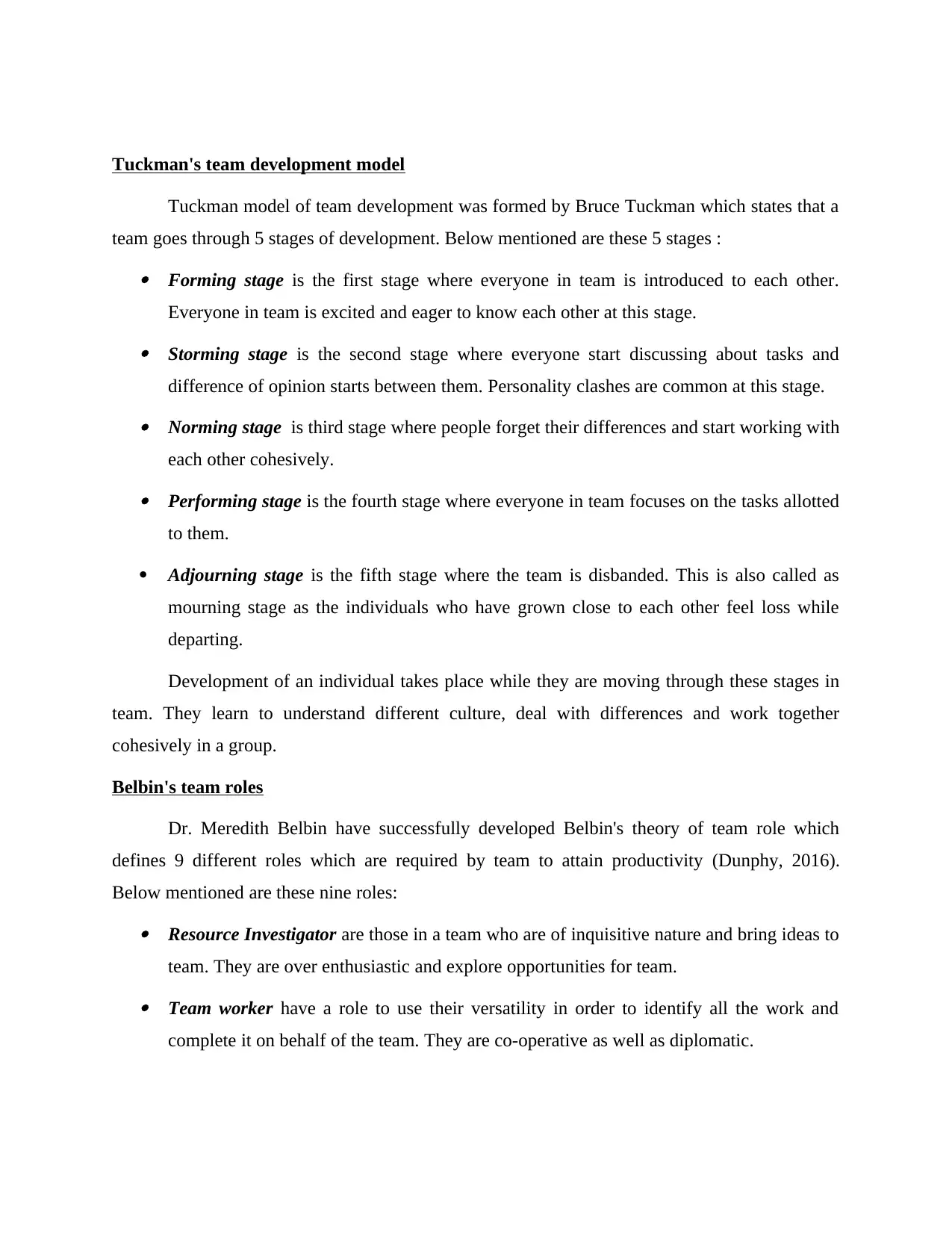
Tuckman's team development model
Tuckman model of team development was formed by Bruce Tuckman which states that a
team goes through 5 stages of development. Below mentioned are these 5 stages : Forming stage is the first stage where everyone in team is introduced to each other.
Everyone in team is excited and eager to know each other at this stage. Storming stage is the second stage where everyone start discussing about tasks and
difference of opinion starts between them. Personality clashes are common at this stage. Norming stage is third stage where people forget their differences and start working with
each other cohesively. Performing stage is the fourth stage where everyone in team focuses on the tasks allotted
to them.
Adjourning stage is the fifth stage where the team is disbanded. This is also called as
mourning stage as the individuals who have grown close to each other feel loss while
departing.
Development of an individual takes place while they are moving through these stages in
team. They learn to understand different culture, deal with differences and work together
cohesively in a group.
Belbin's team roles
Dr. Meredith Belbin have successfully developed Belbin's theory of team role which
defines 9 different roles which are required by team to attain productivity (Dunphy, 2016).
Below mentioned are these nine roles: Resource Investigator are those in a team who are of inquisitive nature and bring ideas to
team. They are over enthusiastic and explore opportunities for team. Team worker have a role to use their versatility in order to identify all the work and
complete it on behalf of the team. They are co-operative as well as diplomatic.
Tuckman model of team development was formed by Bruce Tuckman which states that a
team goes through 5 stages of development. Below mentioned are these 5 stages : Forming stage is the first stage where everyone in team is introduced to each other.
Everyone in team is excited and eager to know each other at this stage. Storming stage is the second stage where everyone start discussing about tasks and
difference of opinion starts between them. Personality clashes are common at this stage. Norming stage is third stage where people forget their differences and start working with
each other cohesively. Performing stage is the fourth stage where everyone in team focuses on the tasks allotted
to them.
Adjourning stage is the fifth stage where the team is disbanded. This is also called as
mourning stage as the individuals who have grown close to each other feel loss while
departing.
Development of an individual takes place while they are moving through these stages in
team. They learn to understand different culture, deal with differences and work together
cohesively in a group.
Belbin's team roles
Dr. Meredith Belbin have successfully developed Belbin's theory of team role which
defines 9 different roles which are required by team to attain productivity (Dunphy, 2016).
Below mentioned are these nine roles: Resource Investigator are those in a team who are of inquisitive nature and bring ideas to
team. They are over enthusiastic and explore opportunities for team. Team worker have a role to use their versatility in order to identify all the work and
complete it on behalf of the team. They are co-operative as well as diplomatic.
⊘ This is a preview!⊘
Do you want full access?
Subscribe today to unlock all pages.

Trusted by 1+ million students worldwide
1 out of 20
Related Documents
Your All-in-One AI-Powered Toolkit for Academic Success.
+13062052269
info@desklib.com
Available 24*7 on WhatsApp / Email
![[object Object]](/_next/static/media/star-bottom.7253800d.svg)
Unlock your academic potential
Copyright © 2020–2026 A2Z Services. All Rights Reserved. Developed and managed by ZUCOL.




